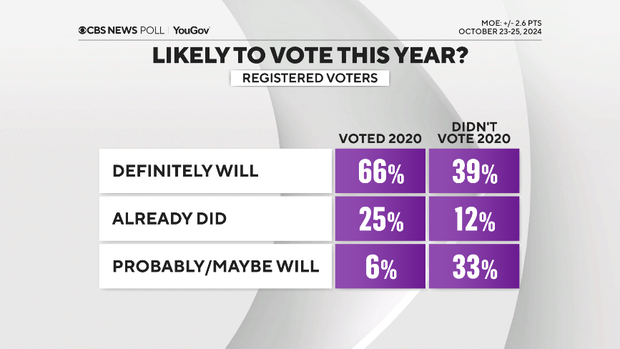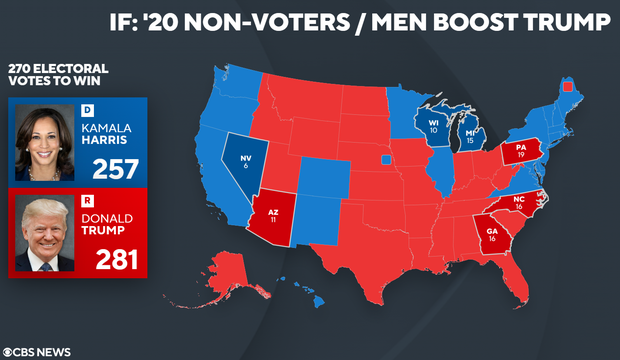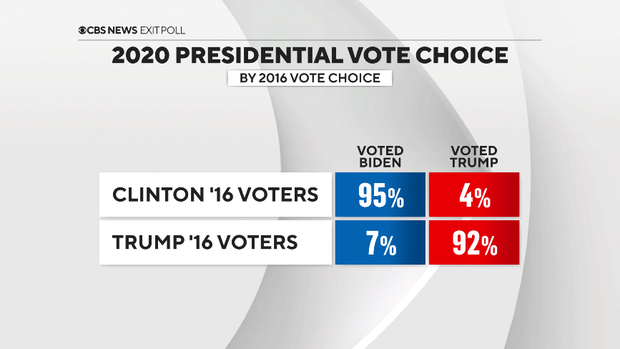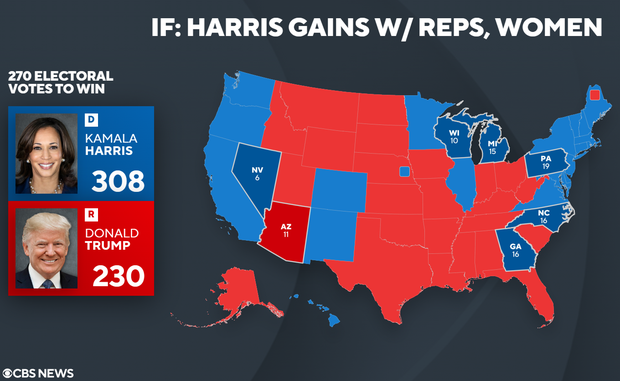With such a close presidential race estimated in the battleground races, a host of factors could tip the 2024 election. We focus on two that have the potential to cause the key states to break toward Kamala Harris or Donald Trump. The first has to do with infrequent voters, and the second depends on how successful the Harris campaign is at peeling off Trump’s previous supporters.
In order to see how these scenarios could play out, we tweak specific parameters in our Battleground Tracker model that is trained on tens of thousands of survey responses collected during the campaign. The resultant estimates below illustrate a range of possibilities to be on the lookout for this week…
Scenario 1: Infrequent voters show up big, driven by Trump-leaning men
The swingiest segment of the electorate — and most challenging to estimate in polling — consists of infrequent voters. We define them here as registered voters who didn’t cast a ballot four years ago.
This group is “swingy” in two ways — their vote choice and whether they turn out at all. They report being more persuadable, in that more of them are unsure of their decision or say they might at least consider the other candidate. And they are disproportionately young, without a history of voting every two to four years.
Infrequent voters are also more likely to be men than women. Notably, we have found that more men overestimate their likelihood of turning out than women. Administrative data indicates that in fact, women vote at slightly higher rates than men do.
Before President Biden dropped out of the race this summer, 2020 non-voters were leaning toward Trump nationally. Since Harris became the Democratic nominee, they have looked very closely divided between her and Trump.
In the battleground states, specifically, this group often still leans toward Trump — if his campaign is successful in turning out these lower-propensity voters, Trump’s vote margins would improve in these states, flipping some Mr. Biden carried four years ago.
How many 2020 non-voters are expected to show up this year? Well, that also depends on the state, but our estimates suggest roughly one in five voters will not have voted in the previous presidential election. In 2020, this number looked higher than that in Arizona and Nevada, and lower in Wisconsin, for example.
Let’s imagine that the Trump campaign boosts the turnout rate of this group in all seven battleground states. Specifically, in this scenario, their share of the electorate grows by five points over baseline estimates, e.g., from 20% to 25% in Pennsylvania.
In this scenario, Trump would flip Arizona, Georgia, and Pennsylvania — states he won in 2016 but lost to Mr. Biden in 2020 — and hold North Carolina. He would lose the other battlegrounds to Harris but end up with more than the 270 electoral votes required to win the presidency. (Scroll to the bottom of this page to see state-specific estimates under different scenarios.)
Map of scenario 1: Shows 2020 non-voters and men giving Trump a boost
Scenario 2: Harris peels off more Trump ’20 voters, driven by GOP women
The 2024 race is marked by a sizable gender gap, with the Harris campaign emphasizing reproductive rights and the state of U.S. democracy. Related to this, the Harris campaign has been deploying messengers like former Wyoming GOP Rep. Liz Cheney to persuade moderate Republicans to back Harris this year. That includes the millions of GOP primary voters who cast votes for Nikki Haley, even after Trump had clinched the party nomination. Most of these voters backed Trump in the 2020 general election.
Persuading supporters of the other party to switch to your side is a difficult task in an era of calcified partisanship. How many Trump 2020 voters might the Harris campaign realistically expect to flip?
A couple of suggestive data points:
- In our polling this year, about 1 in 10 Trump 2020 voters profile as persuadable nationwide and in battleground states. This means they tell us they aren’t firmly committed to Trump. That’s a tough target for the Harris campaign, because some of these voters are leaning Trump’s way and won’t actually change their mind, even if they say they might.
- For context, our 2020 exit polls indicated that only 7% of previous Trump voters flipped to Biden. That defection rate ranged from 6-7% across four battlegrounds that Biden won that year. That’s a more achievable target for the campaign.
In this scenario, imagine that the Harris campaign successfully flips 7% of Trump’s 2020 voters in the battlegrounds. It’s a departure from our baseline estimates, which suggest both a lower defection rate and a roughly equal number of Mr. Biden’s 2020 voters flipping to Trump this year. It amounts to a favorable scenario for Harris, with Democrats netting votes from vote switching in critical states.
Under this set of assumptions, Harris would hold all the states Mr. Biden won four years ago, except Arizona, and also add North Carolina to her column. She would end up with more than 300 electoral votes, securing her place in history as the first woman elected U.S. president.
Map of scenario 2: Shows Harris gaining with Republicans and women





